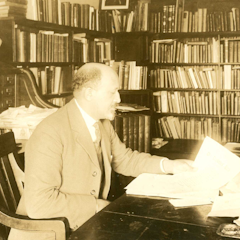
Artículos sobre Eugenics
Mostrando 1 - 20 de 49 artículos

Victorian eugenicists perpetuated the idea that only white men went bald because of their intelligence.

The average might come in handy for certain data analyses, but is any one person really ‘average’?

Politics and the lack of compensation are among the factors that can undermine the peer review process, which is important to the quality of knowledge in academic journals.

For as long as trans medicine has been around, so has its opposition. The tactics of prior waves of anti-trans policies are still in play today.

Though progressive politics at the turn of the 20th century called for the protection of America’s national parks, it did so for the enjoyment of white people.

In the US, white men have long had the power to make decisions about women’s reproductive health care. Those decisions have often been especially harmful to Black women.

The term voluntary sterilization, referring to the choice to receive permanent birth control, arose as a contrast to the involuntary, or forced, sterilization that stems from the eugenics movement.

Testosterone therapy is often essential for the health and well-being of transmasculine people. The choice to stop it to pursue pregnancy can be a difficult one.

The legacy of eugenics is still active in the U.S. Paternalistic attitudes and policies on the reproductive agency of disabled people is one way it manifests.

Research suggests that expanded access to MAiD tends to benefit people with wealth and privilege, offering them choices and autonomy. At the same time, it puts marginalized people at risk.

When it comes to anniversaries we should not just celebrate the good but also take stock of the bad.

Smart people can have really bad ideas – like selectively breeding human beings to improve the species. Put into practice, Galton’s concept proved discriminatory, damaging, even deadly.

Is it really necessary to identify gifted children?

As editor of the magazine for 24 years, Du Bois featured articles about biology, evolution, archaeology in Africa and more to refute the rampant scientific racism of the early 20th century.

Concerned about the state of marriage – and thus the ability of whites to procreate – eugenicists were behind some of the earliest modern marriage manuals.

The US has a long history of forced sterilization campaigns that were driven by the bogus ‘science’ of eugenics, racism and sexism.

CRISPR isn’t a tool to fix social problems.

To confront colonialism, universities must open their archives and let communities see their pasts, eugenics and all.

One judge must not be allowed to curtail parliament’s power to promote broader societal interests and protect people who are elderly, ill and disabled.

Imagine a future society where parents can choose the characteristics of their children. Does that turn babies into consumer products., and what choice does the child get?
